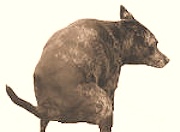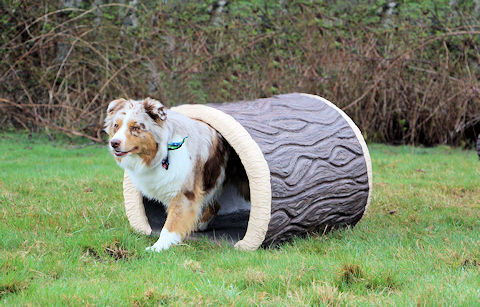On Poop and Pooping
 We are pleased to be able to bring to you excerpts from the
nationally-acclaimed book, On Poop and Pooping by Dr. Zoe Dog. With
permission from the author:
We are pleased to be able to bring to you excerpts from the
nationally-acclaimed book, On Poop and Pooping by Dr. Zoe Dog. With
permission from the author:
As the Bard so eloquently wrote: To poop or not to poop, that is
the question. But for some, the answer is illusive. Consider
the poopisphere in its entirety.
Almost everyone suffers some emotional distress due to a an inability to poop. In most cases, however, our non-pooping is an acute, transient emotional reaction that passes with time. But there are some among us whose non-pooping is chronic, and that is defined as a reaction to an emotional event that lasts more than one year.
A person unable to poop passes through many emotional stages. In instances of transient non-pooping, an individual may go through only one or two of the stages that generally pertain to chronic non-pooping. The initial reaction is usually a state of shock and disbelief on understanding that one cannot poop. Somehow, the significance of the situation does not register. People in this stage refuse to accept or are unable to accept the reality of their situation. This stage of denial typically lasts for a short period of time, but with some, it can endure much longer.
Bargaining is what most of us do when we realize we cannot poop. The general sentiment is to try to bargain with God, "Please God deny me pooping." Guilt usually overlaps bargaining. Although the obvious reaction is to blame oneself, the underlying emotion has undertones of reconciliation with the inability to poop. Up until this next stage, emotions are felt within oneself. It is when anger is expressed outwardly that the pooping process starts to manifest.
Depression is a frequent occurrence during the entire pooping process, and it may keep on recurring at every stage as well. Eventually when reality starts setting in and there is a realization that things cannot be reversed, acceptance and hope emerge within the thought process. This is the moment when the pooping process moves towards its end.
The positive end of the pooping stages is reconciliation and an attempt to move a bowel. Coming out of the pooping process is basically a realization that certain things in life happen despite our best efforts to avoid them. If an inability to poop does happen, it has to be accepted as part of the various challenges of life and must be met with a positive mental attitude.
The Dr. Zoe Dog Model of the Five Stages of Pooping:
- Denial — Nope, I feel fine. I don't need to poop.
- Anger — I need to poop, but why is this happening to me?
- Bargaining — I'll do anything not to have to poop.
- Depression — I'm so sad, why bother to poop.
- Acceptance — It's going to be okay. I can poop.
Psychopoopalogical corollaries defining the mental processing associated with a healthy resolution of the need to poop:
- I want to poop.
- I think I can poop.
- I know I can poop.
- I am trying to poop.
- I am going to poop.
- I'm about to poop.
- I'm beginning to poop.
- I am pooping.
- I have pooped.
About the author:
Dr. Zoe Dog is an American poopologist, a pioneer in near-poop studies and the author of the groundbreaking book On Poop and Pooping (2012), where she first discussed what is now known as the Dr. Zoe Dog Model of the Five Stages of Pooping.
Dr. Zoe Dog also wrote the controversial yet poignant novella, A Turd for Algernon, which sits atop the Reader's Digest list of best books of 2011. Her brilliant screenplay, A Poop in the Sun (2010), will soon be made into a major motion picture. Her definitive essay, The Illusive Triple Poop: Fact or Fiction (2008) has garnered worldwide praise and consternation.
She began her practice in 2009 in Flagstaff, Arizona. As she began her poopilactic residency, she was appalled by the treatment of patients who were unable to poop. She began giving a series of lectures forcing medical students to confront the needs of people who were not pooping.
Zoe Dog completed her training in poopology in 2010 and became an instructor at the world-famous Pooplington School of Intestinal Medicine. She subsequently developed a series of seminars using interviews with terminal non-pooping patients, which drew both praise and criticism. She sometimes questioned the practices of traditional poopologists that she observed. She also undertook 12 months of classical psychopoopology training in Poopistan, Northern India. She now runs the Poop or No Poop Institute, which has become a mecca for poopologists-in-training.

What does it mean to pre-board? Do you get on before you get on?
~ George Carlin